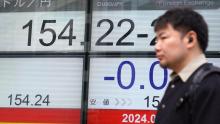Foreign exchange market
Seoul, Tokyo vow 'appropriate action' on weak yen and won
South Korea and Japan shared "serious concerns" on the recent weakness of their currencies against the dollar and agreed to take "appropriate actions" to counter extreme volatility, the finance ministry in Seoul said Wednesday.
Serbian February public debt at 48.7 pct of GDP
BELGRADE - Serbia's public debt rose by 26.3 bln dinars to 4,268.1 bln dinars (36.4 bln euros) in February, accounting for 47.8 pct of GDP.
According to figures released by the Public Debt Administration of the Serbian Ministry of Finance, foreign currencies accounted for 77.7 pct of the total public debt at end-February.
- Read more about Serbian February public debt at 48.7 pct of GDP
- Log in to post comments
Japanese Yen Hits Lowest Level Since 1990
Amid a strengthening dollar fueled by robust U.S. economic indicators, the Japanese yen tumbled to its lowest level in 34 years. On Tuesday, the U.S. dollar surged to 151.97 yen, surpassing the previous multi-year peak set in October 2022. This surge has triggered concerns over Japan's currency stability, prompting Finance Minister Shunichi Suzuki to hint at potential intervention.
- Read more about Japanese Yen Hits Lowest Level Since 1990
- Log in to post comments
Egypt secures extra $5 billion in IMF loans
Egypt has secured an additional $5 billion in IMF loans, after the central bank hiked interest rates and allowed the pound to plunge by nearly 40 percent.
The Central Bank's decision to raise the key deposit rate to a record 27.25 percent caught the market by surprise.
The bank also committed to "allowing the exchange rate to be determined by market forces."
- Read more about Egypt secures extra $5 billion in IMF loans
- Log in to post comments
Şimşek rules out scenarios on real depreciation of Turkish Lira
Finance Minister Mehmet Şimşek has ruled out scenarios regarding the real depreciation of the Turkish Lira after the upcoming local elections.
"We do not have an exchange rate target. We are implementing a policy set which makes the lira attractive," Şimşek said in a televised interview on March 4.
Deciphering the Dynamics: Fundamental Factors That Weave the Currency Relationship between USD and GBP
The Pound/Dollar (GBPUSD) forecast for 2024, as projected by PandaForecast, paints a positive picture for the currency pair. Starting the year at 1.2780, the forecast anticipates an upward trajectory, reaching 1.32 by March. However, a reversal is expected in the last quarter, settling the pair back to 1.28.
Euro Adoption in Bulgaria: Prospects and Concerns for 2025 Transition
As Bulgaria gears up for its much-anticipated integration into the Eurozone in 2025, the journey toward adopting the euro has sparked a mixed bag of expectations and uncertainties among both citizens and economic analysts.
Euro at 25: The value of unity in a changing world
The case for Europe has always rested on solving problems that countries could not address alone. After the Second World War, visionary leaders understood that the only way to secure peace on our continent was to unite our economies. And a united Europe would, in time, require a single currency to make the most of the economic benefits created by this peace dividend.
- Read more about Euro at 25: The value of unity in a changing world
- Log in to post comments
Central Bank will continue to build up reserves in 2024
The Central Bank has said that it will maintain its reserve build-up strategy and ensure continuation of the stable uptrend in international reserves in 2024.
No Central Bank intervention in FX market, says Erkan
The Central Bank is not intervening in the foreign exchange market, Governor Hafize Gaye Erkan has said, pointing out that the increase in reserves is an indication of this.
"If there had been interventions in the U.S. dollar [in the FX market], reserves would have not increased that much," Erkan said in an interview with daily Hürriyet.










